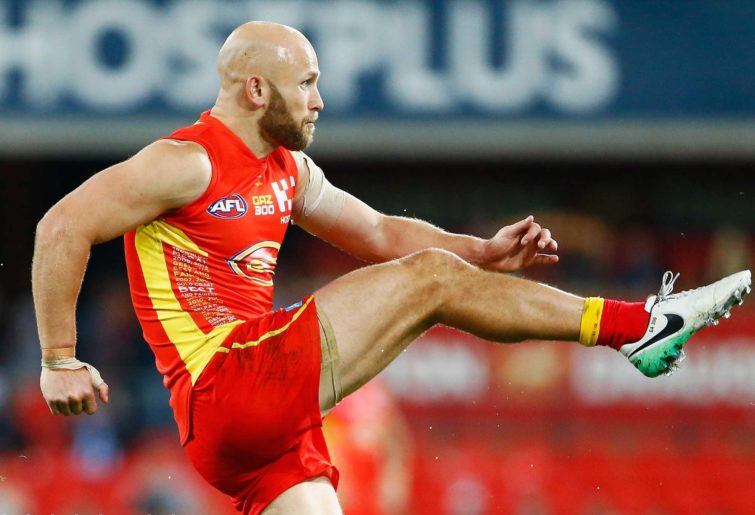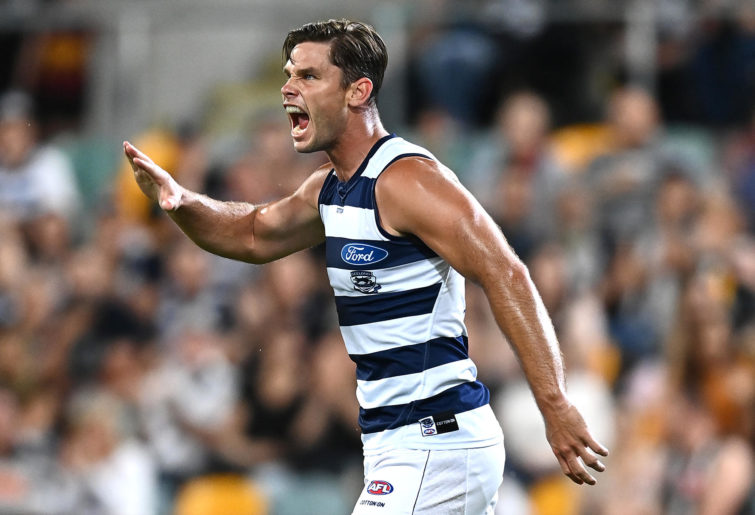AFL News: Scott hits out at 'offensive' Tribunal call to clear Cameron, Pies to swoop on star Dog?
Geelong coach Chris Scott has hit out at the AFL Tribunal's decision to clear Charlie Cameron for his dangerous tackle on Jake Lever, saying…
Opinion
Today marks exactly a decade since one of the most astonishing matches in recent AFL history unfolded at Kardinia Park.
In one corner were the red-hot Geelong Cats, who were being coached by first-year coach Chris Scott, after he’d taken over from Mark Thompson at the end of the 2010 season.
They had been rocked by the sudden departure of 2009 Brownlow Medallist Gary Ablett Jr. who left at the end of the previous season to lead the fledgling Gold Coast Suns, but the Cats didn’t allow his departure to become a distraction entering the 2011 season.
In fact, it only spurred them to become a better side, reinforcing the good old saying that “there is no I in team”, under rookie coach Scott, who had won two flags as a player with the Brisbane Lions in the noughties.
They came up against a Melbourne side which appeared to be building under fourth-year coach Dean Bailey, the side having made some significant strides after four years out of the finals.
While the Cats went into the match as heavy favourites, as was to be expected for a side that had been ruthlessly dominant over the previous four years, nobody could have anticipated what was to occur at Skilled Stadium on Saturday, July 30, 2011.
An astonishing first quarter saw the Cats kick eight goals to nil, two of them going to Cameron Mooney, who would eventually miss out on the club’s 2011 flag at the end of the season.
Dees coach Bailey tried to stem the bleeding by putting Jack Watts behind the ball, with Jack Trengove in support in defence, but it would only get worse as the Cats booted twelve of thirteen goals in the second quarter.
After Mooney kicked his third goal to start the second quarter, Lynden Dunn pegged one back for the Dees, but that would be their only goal of the first half as they went into the half-time break 114 points in arrears.
By that point, ex-Cat Brent Moloney was subbed out of the match for Melbourne due to a virus which had affected him in the first half.
Despite pleas from Bailey to get his young side to regroup and refocus, the Cats continued to run riot, kicking eight goals to four in the third quarter, though the first eight goals were evenly split before the home side booted four to take a 142-point lead into three-quarter-time.
Nine goals to two in the final quarter completed the carnage, by the end of which the Cats won by a whopping 186 points, eclipsing their 164-point win over the Brisbane Bears at the old Carrara Stadium in round seven, 1992, for the biggest win in club history.
However, they fell just four points short of the biggest winning margin in VFL/AFL history, when Fitzroy destroyed Melbourne by 190 points in round 17, 1979, and six points short of the highest score ever, which the Cats themselves set in that same 1992 game (37.17 (239)).
Steve Johnson booted seven majors – as many as the entire Melbourne side did – and earned two Brownlow Medal votes, while future captain Joel Selwood, then in just his fifth season of AFL football, gathered 43 disposals and earned the three votes.
Corey Enright garnered the other vote, booting two goals from 35 touches.
Among the other records to fall on that winter day ten years ago, the Cats became the first side to ever score 50 points or more in a quarter, and recorded 510 disposals as a team – 228 more than the whole Melbourne side.
Reflecting on the match in an interview with Triple M in 2018, Cameron Mooney described the match as “his last good game” and said he actually felt sorry for some of the Melbourne players, not least James Frawley, who was one of his opponents that day.
Four years after that dark day in Geelong, Frawley went on to win a premiership medal with Hawthorn in 2015, and then retired at the end of 2020 before St Kilda threw him a lifeline ahead of this season.
Perhaps a sign of the things to come on that day came when the Geelong Cats’ VFL side thrashed fifth-placed Casey by 128 points in the curtain-raiser match that was played in the morning.
The Casey side that day featured ex-Carlton and Brisbane Lions forward Brendan Fevola, who kicked four goals, as well as current Melbourne captain Max Gawn, forward Aaron Davey and former Hawthorn premiership ruckman Robert Campbell.
Turning out for the Cats’ VFL side was ex-Brisbane Lion Troy Selwood (the brother of Joel), who kicked seven goals, as well as current Port Adelaide player Steven Motlop and now-Sun George Horlin-Smith.
In the end, the fans who packed Skilled Stadium saw their VFL and AFL sides kick a combined score of 68.17 (425) and win by a combined margin of 314 points across eight quarters of astonishing football.
On a horrific day for the Melbourne Football Club, Lynden Dunn booted two goals while Jordie McKenzie was their leading possession getter with 25 touches.
Coach Dean Bailey said after the match that he felt “embarrassed” and that the club had endured “a really dark two hours today”.
“As each goal was scored, it nearly drained the confidence out of the group for the rest of the game and some of the goals they (the Cats) kicked were embarrassingly easy.”
“The biggest challenge will be that they stay united and they have just got to work their way through [this]. There is no point pointing fingers at all”.
The 186-point loss meant the Dees laid claim to the two worst losing margins in the game’s history.
Twenty-four hours after the siren blew, Bailey was given his marching orders following a snap crisis meeting and replaced in the interim by Todd Viney.
Then-Collingwood president Eddie McGuire slammed the move, saying the club pulled the trigger too early.
The club limped to the finish line in the final month of the season, winning only one more game (against the Gold Coast Suns in round 23) en route to finishing 13th on the ladder, ensuring they’d miss finals for a fifth (of twelve) straight year.

Gary Ablett with the Suns (Photo by Jason O’Brien/AFL Media/Getty Images)
From the Melbourne side that disgraced itself that day, only Nathan Jones remains at the club today; though present-day players Neville Jetta and Max Gawn were also on the list that year, neither played in the match.
Bailey subsequently joined the Adelaide Crows and it did not take long for him to get some personal revenge on the Cats when the Crows won by 50 points at AAMI Stadium in round seven, 2012.
Then, in round 18 later that season, nearly a year to the day since he and the Melbourne Demons left Kardinia Park in disgrace, he and the Crows suffered a 27-point defeat.
Bailey sadly passed away in March 2014 after succumbing to lung cancer, but despite the brutal nature in which his coaching career ended, he was still remembered fondly by Melbourne officials.
At the end of the 2011 season, Mark Neeld was appointed coach of the club, only to be sacked halfway through the 2013 season when their fortunes only got worse; Paul Roos was then hired to resuscitate the club before Simon Goodwin took over in 2017.
A decade on from the Melbourne Football Club’s darkest hour, the present-day side are well in contention for this year’s flag, with the club’s playing list having undergone some significant changes after a prolonged period of mediocre on-field results.
As for the Cats, the following week, they picked up where they left off, thrashing the Gold Coast Suns by 150 points at home, making them the first club since St Kilda in 2004 to win consecutive matches by more than 100 points.
They also became the first club to win consecutive matches by 150 points or more, and their combined winning margin of 336 points across two consecutive matches broke the record of 293 previously held by the Sydney Swans in 1987.
Three weeks after winning those two matches, the Cats then had their 29-match winning streak at Kardinia Park snapped by the Swans, losing by 13 points in the penultimate round of the season.
It was to be their final loss of the year, as they then went on to win their ninth flag thrashing Collingwood by 38 points in the Grand Final.
From the Cats side that smashed all types of records against the Dees in Round 19, 2011, only three players remain at the club today – Joel Selwood, Tom Hawkins and Mitch Duncan.

Tom Hawkins (Photo by Quinn Rooney/Getty Images)
Of the three, Duncan did not play last week against Richmond, and is unlikely to return until at least the first week of the finals series.
To the present day, the Cats have continued to maintain a high level of consistency, despite having not won a flag since 2011, and are well in the mix for this year’s flag, having missed out when they lost to the Tigers by 31 points in last year’s Grand Final at the Gabba.
But if there was ever one match that was symbolic of their present-day consistency, it was their record 186-point thrashing of Melbourne that occurred on this very day in 2011.
That match set a number of records that are very likely never going to be broken, or matched, in this modern day and age.